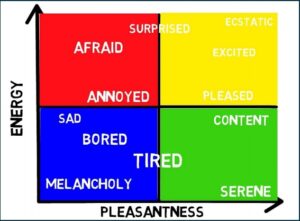“It’s not my mother nor my father, not my brother nor my sister, but it’s me.” Prayer song
In this segment I want to talk to you about emotional mastery and the reason why I decided to share the quote above is actually the first step towards emotional mastery: adopting full responsibility for how you feel.
Having an internal opposed to having an external locus of control, like we talked about in one of the previous lectures.
You probably hear it all the time: “this person made me feel this way”, “that person made me feel that way”, “this situation made me feel this way” and so on. You have to get those sentences out of your vocabulary.
Aside from adopting full responsibility for how you feel, when it comes to mastering your own emotions you have to know how to identify them before anything else. I want to share with you a
powerful tool for doing that, this will especially be of benefit to guys that are reading this because rarely do some of us know how to express how we’re feeling. I’ve been there, but this graph will change it all.

What will be of great benefit to you is coming back to this graph and memorizing it so that every time you ask yourself how do you feel, you’ll have the answer.
Myself, for example, I was repeating a pattern that got me into depressive states and that is that I only looked at how I feel based on my energy levels, so if I felt low in energy I always linked that to melancholy, a depressive state. So with my thoughts I actually guided myself there because I didn’t include pleasantness in the picture.
By including pleasantness you can determine a whole new variety of emotions, like serene for example, that is a state of calmness. Or you might just be tired but you misidentified it as being
depressed just because you’re low in energy.
Another powerful trick I learned from Simon Sinek is on how to eliminate nervousness before a big event.
When you’re “nervous” there are certain physical symptoms you get. Your heart starts pounding faster, you start breathing a bit deeper, you anticipate on what’s coming, you start sweating a bit and you interpret that as being nervous.
On the other side what stimuli do you experience when you’re excited? Those are the same stimuli.
So whenever you ask an Olympic athlete how they feel before a game they’ll always tell you that they’re excited instead of nervous, yet if you were in their skin you would probably tell based on the same stimuli that you’re nervous.
Knowing this use it to your advantage. Next time you experience “nervousness” tell yourself and interpret it as excitement and practice doing that every single time. You will gain confidence to go into action instead of retrieving when you interpret it as nervousness.

